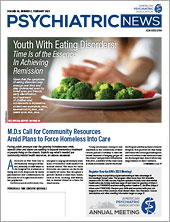OTC Naloxone Spray Granted Priority Review
The Food and Drug Administration (FDA) has accepted for priority review a New Drug Application (NDA) for Harm Reduction Therapeutics Inc.’s OTC RiVive (3.0 mg intranasal naloxone) for the emergency treatment of opioid overdose, the company announced in December. The company submitted the NDA after the FDA encouraged pharmaceutical companies to develop new non-prescription naloxone products.
The NDA is supported by a phase 1 clinical trial showing that RiVive produces a threefold higher systemic exposure to naloxone and has similar early absorption compared with another naloxone product. Other research showed that non-health professionals were able to administer RiVive in a simulated emergency overdose situation.
Harm Reduction Therapeutic Inc. says it expects to hear a decision on approval from the FDA by the end of April.
Fanapt May Improve Bipolar I Symptoms
A phase 3 trial of Fanapt (iloperidone tablets) suggests the medication may improve symptoms of acute manic and mixed episodes in adults with bipolar I disorder, Vanda Pharmaceuticals announced in December. Fanapt is a novel atypical antipsychotic that is approved by the FDA for treating schizophrenia in adults.
In the trial, approximately 400 volunteers with a history of bipolar I disorder who had a current episode of mania were randomized to receive either Fanapt or placebo. The primary endpoint was improvement in scores on the Young Mania Rating Scale (YMRS). The researchers assessed the patients once per week for four weeks. Beginning in the second week, patients who took Fanapt had greater improvements on their YMRS scores than those who took placebo. Those who took Fanapt also had greater improvements on the Clinician Global Impression of Severity and Clinician Global Impression of Change compared with those who took placebo.
Vanda plans to submit its data in a supplemental NDA this year.
Vraylar Approved as Adjunctive Treatment for Major Depressive Disorder
In December the FDA approved Vraylar (cariprazine) as an adjunctive therapy to antidepressants for the treatment of major depressive disorder (MDD) in adults, AbbVie announced.
In a phase 3 study of 759 adults with MDD, patients who took 1.5 mg cariprazine daily experienced a statistically significant change from baseline to week six in the Montgomery-Åsberg Depression Rating Scale (MADRS) total score compared with those who took placebo. In a second study, patients who took 2 mg to 4.5 mg of cariprazine per day also experienced a significant change from baseline to week eight in the MADRS total score compared with those who took placebo. In both of these studies, no new safety events were identified.
The starting dose of Vraylar is 1.5 mg once daily. The dosage can be increased to 3 mg daily on the fifteenth day if the patient responds well to the lower dose and tolerates the drug. In clinical trials, dosage titration at intervals of less than 14 days resulted in a higher incidence of adverse reactions.
FDA to Again Review Brixadi for Treating OUD
The FDA has accepted a resubmitted NDA for Brixadi (buprenorphine) extended-release weekly and monthly subcutaneous injection for treating moderate to severe opioid use disorder (OUD) in patients who have already begun treatment with a dose of transmucosal buprenorphine or are already being treated with buprenorphine, Braeburn announced in December.
The FDA previously sent Braeburn letters in 2020 and 2021 saying that Brixadi could not be approved because of quality-related deficiencies found at a third-party manufacturing facility in the United States.
In a phase 3 trial, 428 adults with OUD were randomized to receive either Brixadi or daily sublingual buprenorphine/naloxone for 24 weeks. Patients in both groups had similar rates of weekly and monthly negative urine tests, suggesting that Brixadi is about as effective as sublingual buprenorphine/naloxone in treating OUD. ■
